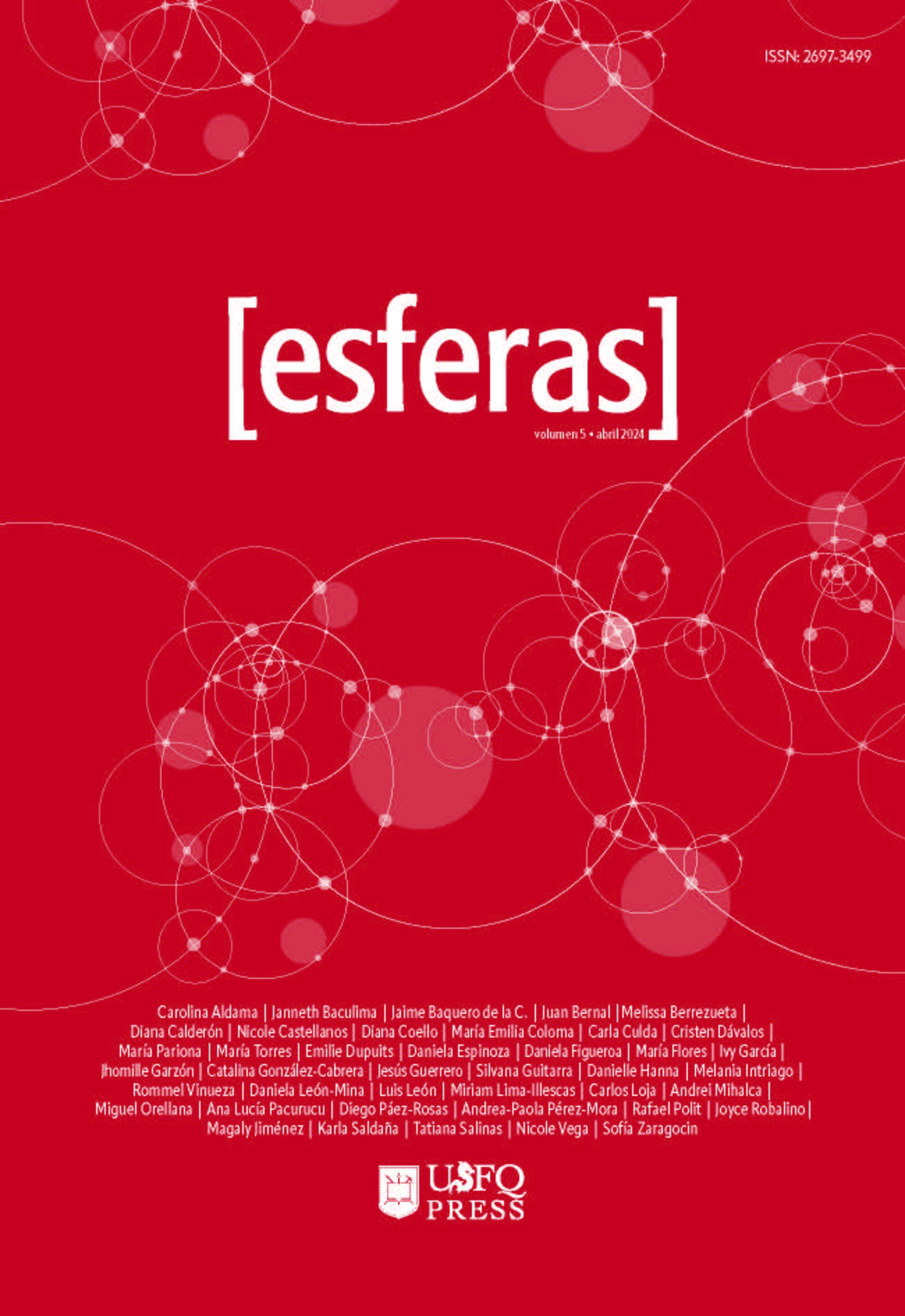Water justice and reciprocity between the city and the communities of the Ñukanchik Urku páramo in Cangahua, Ecuador
Published 2024-04-01
Keywords
- knowledges,
- imaginary territories,
- Ecuador,
- community
How to Cite
Copyright (c) 2024 Emilie Francoise Depuits, Carolina Aldama Dewit, María Emilia Coloma Romo, Daniela Espinoza, Jesús Guerrero, Danielle Hanna, Tatiana Salinas, Melania Intriago Loor

This work is licensed under a Creative Commons Attribution-NonCommercial 4.0 International License.
Abstract
In Ecuador, paramo ecosystems are essential for the production of water for human consumption and irrigation. Some páramos in the country are managed by local and indigenous communities that have contributed to their conservation through water and páramo management plans based on values of reciprocity, territory and culture. However, there is a need to recognize and consolidate these community water and páramo conservation initiatives at the regional and national levels. One way to respond to this objective is to promote the environmental education of young people between urban-rural areas in order to develop an exchange of knowledge, know-how and practices. For this reason, the project 'Conociendo los páramos comunitarios del Ecuador' (Getting to know the community paramos of Ecuador) aims to take young people (high school and university level) from the city of Quito to get to know community paramos in the Cayambe area through exchanges with young people who live in communities that care for water and the páramo. The broader objective is to create a new generation of community water and páramo guardians in Quito who can disseminate their knowledge and encourage a dialogue of knowledge between urban-rural areas.
Downloads
References
- Berkes, F., Colding, J., Folke C. (2000). Rediscovery of Traditional Ecological Knowledge as Adaptive Management [El Redescubrimiento del Conocimiento Tradiconal como Manego Adaptativo]. Ecological Applicactions, vol 10(5), pp.1251-1262. https://doi.org/10.1890/1051-0761(2000)010[1251:ROTEKA]2.0.CO;2
- Boelens, R. (2015). Water, power and identity: The cultural politics of water in the Andes. Routledge. https://doi.org/10.4324/9781315867557
- Boelens, R., Cremers, L., & Zwarteveen, M. (2011). Justicia hídrica: acumulación, conflicto y acción social, 13-22. IEP Instituto de Estudios Peruanos, Fondo Editorial PUCP.
- Boelens, R., Hoogesteger, J., Swyngedouw, E., Vos, J., & Wester, P. (2016). Hydrosocial territories: a political ecology perspective. Water international, 41(1), 1-14. https://doi.org/10.1080/02508060.2016.1134898
- De la Cadena, M. (2015). Earth beings: Ecologies of practice across Andean worlds. Duke University Press.
- Damonte Valencia, G. H. (2015). REDEFINIENDO TERRITORIOS HIDROSOCIALES: CONTROL HÍDRICO EN EL VALLE DE ICA, PERÚ (1993-2013). Cuadernos De Desarrollo Rural, 12(76), 109–133. http://dx.doi.org/10.11144/Javeriana.cdr12-76.rthc
- Dussel, Enrique (2019). "Epistemological Decolonization of Theology". In Barreto, Raimundo; Sirvent, Roberto (eds.). Decolonial Christianities: Latinx and Latin American Perspective. Springer Nature. pp. 25, 26.
- Ford, J.D., Cameron, L., Rubis, J., Maillet, M., Nakashima, D., Willox, A.C., Pearce, T. (2016). Including Indigenous knowledge and experience in IPCC assessment reports. Nature Climate Change, vol 6, pp. 349-353. http://dx.doi.org/10.1038/nclimate2954
- García, G. (2019). Aproximaciones al concepto de imaginario social. Civilizar: Ciencias Sociales y Humanas, 19(37), 31-42. https://doi.org/10.22518/usergioa/jour/ccsh/2019.2/a08
- Hernandez J., Meisner J., Jacobs L.A., Rabinowitz P.M. (2022) Re-Centering Indigenous Knowledge in climate change discourse. PLOS Climate, vol 1(5) https://doi.org/10.1371/journal.pclm.0000032
- Hofstede, R., Mena-Vásconez, P. y Suárez Robalino, E. (Eds.) (2023). Los páramos del Ecuador: Pasado, presente y futuro. USFQ PRESS
- Hommes, Hoogesteger & Boelens (2022). (Re)making hydrosocial territories: Materializing and contesting imaginaries and subjectivities through hydraulic infrastructure. Political Geography, Volume 97. https://doi.org/10.1016/j.polgeo.2022.102698
- Hidalgo, Boelens & Vos (2017). De-colonizing water. Dispossession, water insecurity, and Indigenous claims for resources, authority, and territory. Water Hist 9, 67–85 (2017). https://doi.org/10.1007/s12685-016-0186-6
- Imio, J. & Fonseca, F. (2022). Construcción y posicionamiento del imaginario sociotécnico: “Energía 2050”. Revista Austral de Ciencias Sociales 42: 145-159. https://doi.org/10.4206/rev.austral.cienc.soc.2022.n42-08
- Lang, M. (2022). Buen vivir as a territorial practice. Building a more just and sustainable life through interculturality. Sustainability Science, 1-13. https://doi.org/10.1007/s11625-022-01130-1
- Llambi L. D., Soto Werschitz A., Célleri R., De Bievre B., Ochoa-Tocachi B. y Borja P. (2012). Ecología, hidrología y suelos de páramos. Proyecto Paramos Andinos: Ecuador. Pág. 238, 239.
- López-Sandoval, M., & Maldonado, P. (2019). Change, collective action, and cultural resilience in páramo management in Ecuador. Mountain Research and Development, 39(4), R1. https://doi.org/10.1659/MRD-JOURNAL-D-19-00007.1
- Manosalvas R., Hoogesteger J., Boelens R. 2021. Contractual Reciprocity and the Re-Making of Community Hydrosocial Territories: The Case of La Chimba in the Ecuadorian páramos, Water, Vol. 13, No. 1600. https://doi.org/10.3390/w13111600
- Oslender U. (2019) Geographies of the Pluriverse: Decolonial Thinking and Ontological Conflict on Colombia’s Pacific Coast, Annals of the American Association of Geographers, 109:6, 1691-1705, https://doi.org/10.1080/24694452.2019.1572491
- Swyngedouw, E. (1999). Modernity and hybridity: nature, regeneracionismo, and the production of the Spanish waterscape, 1890–1930. Annals of the association of American Geographers, 89(3), 443-465. https://doi.org/10.1111/0004-5608.00157



